Top 12 best construction management software companies

Improve and optimize client, employee, and project management with the best construction management software. Find the best software for your construction business.
Construction managers must prioritize the project owner’s interests. This involves overseeing everything from the pre-planning phase to close-out. This is where finding the best construction management software will help.
Based on our firsthand experience, managers need a range of construction management tools to nail every job and make clients happy.
The good news is that there are a ton of construction management software solutions that provide the tools you need, including:
- File versioning.
- Approvals.
- Project signoffs.
The trick is finding the right one for your business.
Keep reading to discover the best software solutions to enhance your construction business.
Find a field management solution for your industry
Not in the construction business? There are several cloud-based software solutions for other types of trades and field service providers. Find the best ones in your industry below:
- Top 12 best carpet cleaning software
- Top 10 best commercial cleaning software
- Top 13 best electrical contractor software
- Top 10 best elevator service software
- Top 10 best general contractor software
- Top 11 best installation scheduling software
- Top 12 best janitorial software companies
- Top 11 best software for painting contractors
- Top 13 best pressure washing software
- Top 12 best property maintenance software
- Top 10 best mechanical contractor software
Construction project management software is a solution for managing jobs in residential and commercial construction.
Construction managers have multiple responsibilities, including:
- Project and cost management.
- Time management.
- Quality control and assurance.
- Contract administration.
- Safety and compliance management.
- Construction site security monitoring.
- Safety training and certification management.
As per our expertise, the best construction management software solutions benefit your construction business by simplifying the way you accomplish these tasks. With this kind of software, you can:
- Enhance resource allocation and workforce optimization.
- Automate and simulate processes.
- Enhance efficiency with tools that let you collaborate better.
- Simplify field service technician dispatch and access real-time progress reporting.
- Analyze key metrics that inform future decisions.
- Access on-site client and customer communication through mobile app features for field staff.
How do you manage a construction project?
Managing a construction project is complex. It involves multiple elements from planning to execution. Here are some of the important steps you should follow:
1. Define the project scope: Your first step is to define the project’s goals, deliverables, tasks, costs, and deadlines. You can include this information in your project charter.
2. Detailed planning: Next, you need to create a detailed project plan. This includes timelines, resource and labor scheduling, a project profitability analysis, a budget, and potential risks. Define milestones to keep track of project progression.
3. Assembling a team: Identify and assemble your project team. This can include onsite labor, project managers, subcontractors, engineers, architects, and more.
4. Executing the plan: With planning complete, it’s time to start the actual work. Make sure you properly manage personnel and resources while keeping an eye on the project’s timeline and budget.
5. Monitoring: Utilize your project management and reporting and analytics for business insights and to monitor job progress. Be prepared to adjust your plan as necessary, addressing any issues that arise.
6. Closing out: Project reviews are an essential part of completing a job. They involve making sure all the requirements on a contract have been met. You should also take the time to reflect on successes and areas for improvement.
In the construction industry, you also need to ensure:
- Regulatory compliance records and reporting for accountability.
- Vendor and supplier relationship tracking and analysis for quality assurance.
- Equipment inspection and certification tracking for compliance and reliability.
- Safety compliance documentation tracking and verification for worker safety.
- Energy efficiency monitoring.
- Environmental impact assessment monitoring and reporting for sustainability.
- Equipment performance and cost analytics for optimization of resources.
Keep in mind that every project is unique, so you may need to adapt these steps to fit your project needs.
Construction management software is the best way to manage your complex processes, from automating invoicing to providing real-time data and analytics.
How does construction management software work?
Now you know what construction management software is, but do you know how it works? Put simply, it’s all about integration and automation. From planning to completion, the software acts as a master control, coordinating all your moving parts.
Construction management software steps in to ensure everything will operate smoothly for you, whether it’s:
- Generating accurate project estimates.
- Overseeing timelines.
- Managing contracts and document collaboration with external stakeholders.
- Safety regulations.
- Project risk assessment and analysis.
Let’s dive deeper into the individual gears that make up this powerful engine.
What are the common features of construction management software?
Drawing from experience, no two construction project management solutions are the same, which is why you have to know your business needs before you start shopping for the right one.
That said, there are a few essential features to look out for no matter what solution you choose. These features include:
- A single platform for managing customer information.
- A centralized dashboard that streamlines project planning and scheduling.
- A tool that helps in estimating costs.
- Cross-platform functionality that integrates with accounting systems.
- Employee time-tracking features where field workers can submit timesheets while on the move.
- An app that is compatible with mobile devices for on-the-go access.
Look for software that doesn’t just track quantities with inventory and materials demand forecasting and provide inventory reorder point alerts, but one that also:
- Includes materials and inventory auditing for compliance.
- Streamlines procurement and inventory tracking.
- Provides real-time inventory usage reporting.
Aside from powerful procurement and supply chain management, ensure that you choose a solution that:
- Optimizes resource allocation and labor scheduling.
- Offers submittal and RFQ management.
- Includes reliable customer support and training.
- Provides punch list and deficiency tracking.
- Can offer efficient materials and inventory auditing capabilities.
- Prioritizes vendor and supplier relationship management.
- Invests in vendor and supplier relationship development.
After putting it to the test, these features benefit your construction business in several ways. Let’s take a look at what they are.
What are the key benefits of using construction management software?
Here are some top benefits your construction business gains from using construction management software.
Reduce risk
Our investigation demonstrated that the top risks that have a large impact on a construction project are:
- Poor project management techniques.
- Lack of coordination.
- Inaccurate cost estimates.
Choosing the best construction management software solution for your business facilitates risk management and mitigation. If you’re in the construction industry, risk assessment and mitigation plan monitoring and documentation for safety are crucial.
Improve document management
A cloud-based construction management software lets construction managers store and organize all relevant documents in one place. It also provides document archiving and retention to manage construction documents and files effectively.
Combining strong document management with collaboration and communication tools also facilitates easier sharing while your software tracks and monitors project progress in real-time. This includes options like:
- Project document version control.
- Project communication and collaboration logs for transparency and accountability.
- Notifications and comments to keep all stakeholders updated.
Manage costs
The best construction management software comes with several financial management features, from forecasting tools to real-time syncing with accounting software. This enables accurate cost estimation and budgeting.
With these financial tools, you also ensure that projects stay within their budgets and that your customers stay happy.
Eliminate manual processes
While the world continues to go digital, the construction industry is still slow to adapt.
Completing tasks with pen and paper is slow and increases the risk that construction companies make errors. Software provides a centralized platform for project management, where construction managers can rely on technology for more accurate paperwork.
Enhance efficiency
Our research indicates that administrative tasks take up about 40% of employees’ time.
With a good project management solution, construction managers free up that time to spend on more productive activities, such as winning more jobs.
Time is money, and a good software system saves you both — as it enhances productivity and project success rates.
Now, let’s look into how to choose the best construction management software for your business’ success.
Market trends in construction management software
The construction management software industry is experiencing a dynamic shift, driven by advancements in technology.
With the power of the cloud, you can leverage remote project monitoring and control, which means you can access your project data from anywhere. Cloud-based software:
- Eliminates the need for maintaining in-house servers.
- Allows for seamless communication among teams.
- Facilitates document sharing and collaboration.
With more mobility and functionality that enables real-time data access and reporting, web-based solutions are helping businesses become more efficient.
Additionally, the no-code movement is reshaping the construction management software industry. With no-code platforms, your business gets customization and personalization options to tailor your software with ease. Your team doesn’t have to write a single line of code.
This type of software lets even non-technical users adapt it to their unique needs to drive efficiency. It also empowers businesses to quickly adjust their workflows as requirements change.
Integration with industry-specific tools and standards is another growing trend, as construction projects involve many aspects. Common features include:
- Equipment maintenance scheduling and cost analysis for operational efficiency
- Time management and inventory management for compliance auditing and reporting.
- Safety and quality control with incident investigation and reporting.
Good modern software seamlessly integrates with your other business tools. For example, you can send emails from your management software without having to enter your email application.
Data is easily shared between integrated systems, reducing manual data entry and ensuring consistency across all platforms.
Factors to consider when shopping for the best construction management software
Just as a well-designed logo communicates a company’s values at a glance, a well-implemented construction management software showcases your project’s progress and financial status. It also provides tools for scheduling and task allocation.
So, choosing the right software is crucial.
When looking for the best construction management software, you need to consider these four factors.
- Your business needs. Ask yourself the following questions: What areas are you lagging in? What are your pain points? Which departments will benefit from automation?
- Your budget. There’s free construction management software and solutions that cost thousands of dollars. The software solutions with lots of bells and whistles cost more than simpler programs. Find a company that allocates resources optimally for construction projects.
- Your growth plans. If you plan to expand your company in the future, you want to use a software solution that enables scalability for project growth. Find a provider that offers software that you can customize to accommodate more tools later on.
- Your employees‘ technical abilities. Not everyone has the same level of tech-savviness. Make sure to find a software solution that prioritizes ease of use, even for the most tech-averse employee. It’s equally important to include this for field service technician training records.
With all this new construction management software knowledge, you’re ready to choose the best one for your business.
The top 12 best construction management software for your business
Now that you know what to look for in the right construction management tool, it’s time to narrow down your options. Here are the 12 best construction management software solutions available today:
- Method:Field Services
- Inspectivity
- VisiLean
- ProCore
- Sage 100 Contractor
- FieldWire
- Buildertrend
- Float
- STACK
- 123worx
- PlanGrid
- PENTA
1. Method:Field Services
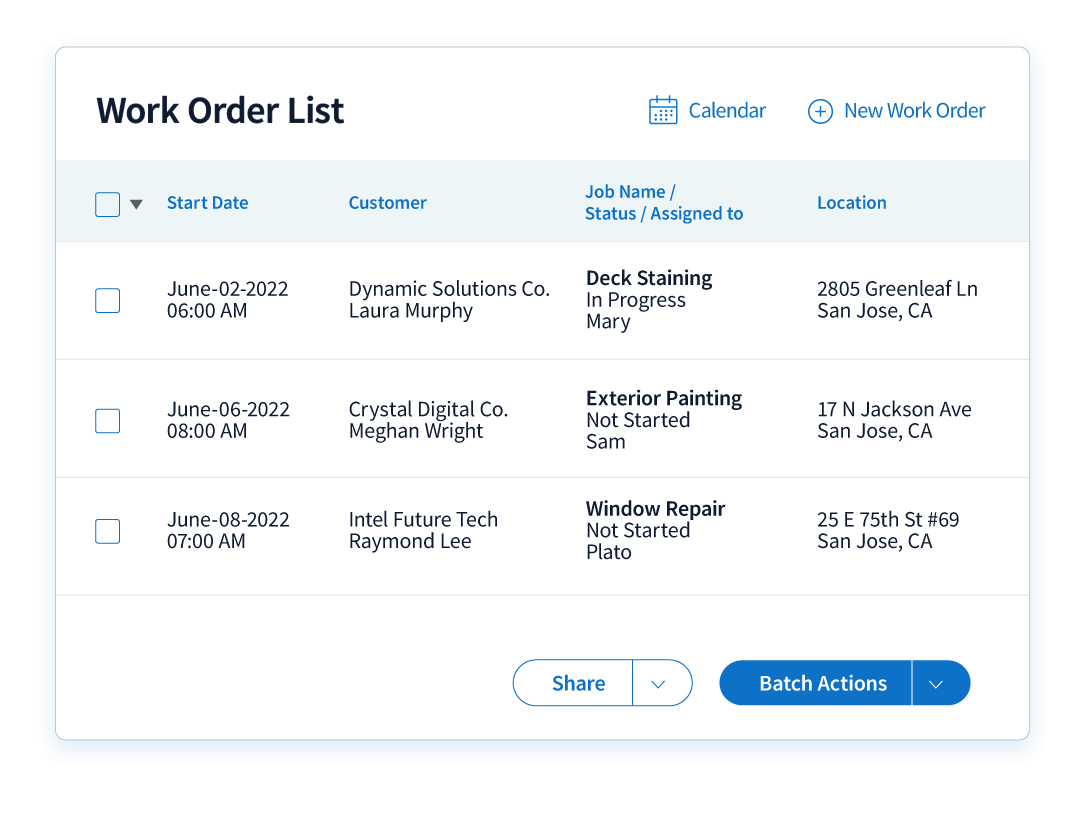
Starting off our list of the best construction management software is Method:Field Services.
After putting it to the test, Method:Field Services is the best solution for QuickBooks users in several industries, from plumbers to construction managers. Method’s two-way sync means that your entire team always has the most up-to-date information.
As an all-in-one project and resource management solution, Method:Field Services comes with an array of features, including:
- The ability to convert estimates into invoices in a few clicks.
- Efficient work order management.
- A 360-degree view of your customers.
- Mobile accessibility through an app to receive real-time communication and updates from your crew.
- Custom reporting that analyzes project data for insights and improvements.
Plans and pricing
This cloud-based solution costs $15 per user per month. Method:Field Services also offers a 14-day free trial with no credit card or contract required.
2. Inspectivity
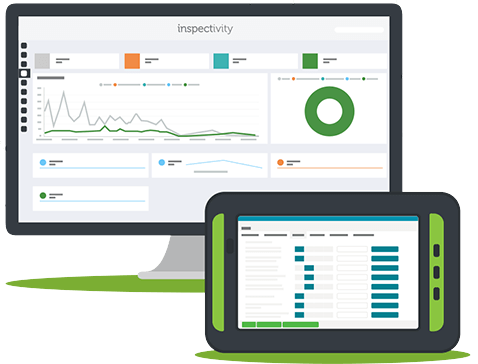
Next, we have Inspectivity.
Inspectivity is a cloud-based platform that digitally transforms your inspection process. This engineering inspection and building and infrastructure asset management solution is most popular among businesses in the energy, mining, and engineering fields.
It involves field inspection and reporting that covers all aspects of the job, including incident and accident reporting. Inspectivity gives you an edge when it comes to inspection and testing records for compliance verification and assurance of quality.
After using Inspectivity, we have found that you can:
- Access a range of templates for inspection forms and checklists.
- Gain crucial insights through asset performance and maintenance history.
- Perform offline field inspections using a mobile app that allows for photo and video sharing.
3. VisiLean
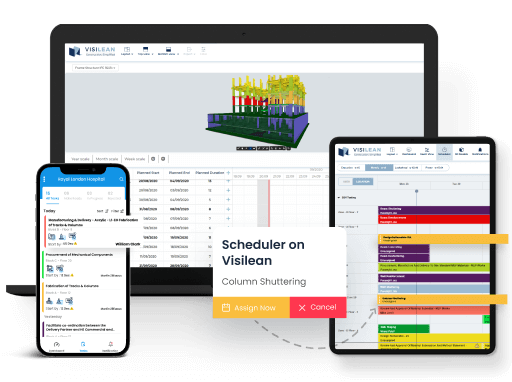
Next on our list of the best construction management software products is VisiLean.
What makes VisiLean stand out is that it’s one of the first construction management software solutions to offer a Lean-BIM integration that lets you visualize your models.
VisiLean’s greatest strength lies in its change order approval workflows. This feature simplifies the process of managing and approving changes, ensuring that all modifications are tracked and implemented efficiently.
When we trialed this product, we learned that VisiLean:
- Generates comprehensive reports on project performance, including delayed tasks, Percent Plan Complete (PPC), and daily progress reports (DPR).
- Integrates tasks with the Building Information Model to create live 3D visualizations.
Plans and pricing
VisiLean offers a free trial for 30 days. After that, you can consult with the provider for a custom quote based on your business’ needs.
4. ProCore
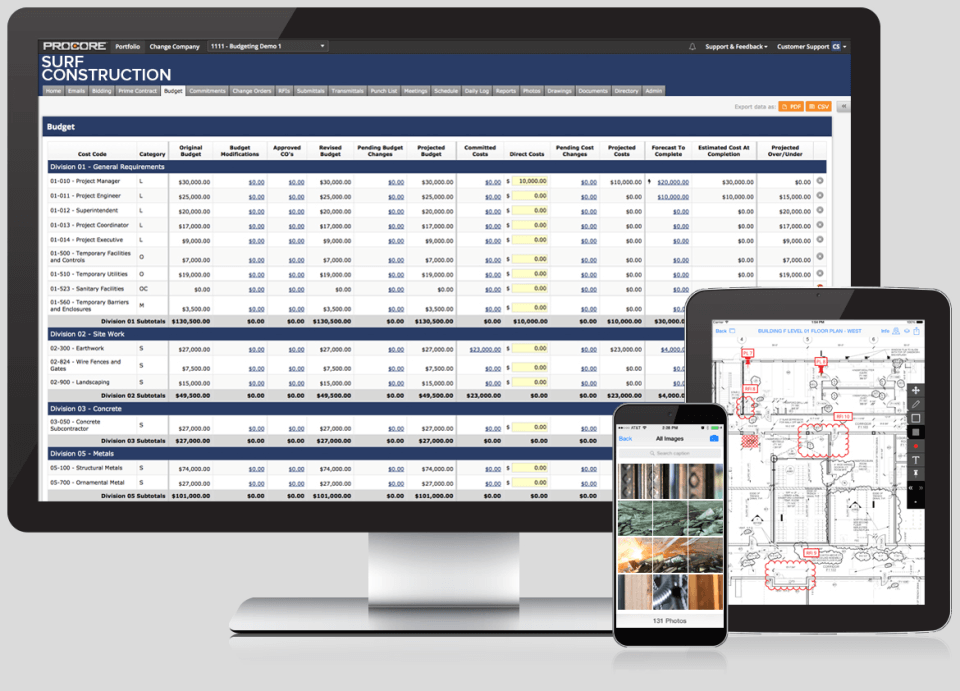
Procore is one of the best construction management software solutions that coordinates activities among team members and stakeholders. It provides complete visibility of every aspect of a project by letting you track processes, tasks, and documents through the platform.
Here’s what you can do with Procore:
- Data capture while you’re on the job site with reporting to keep accurate data in one centralized location. This lets you communicate better and minimize disputes on schedules, job costs, assets, etc.
- Identify patterns and trends with customized reports from Procore Analytics.
- Ensure quality and accountability in the supply chain with efficient supplier and vendor performance tracking.
Plans and pricing
Quotes and demo opportunities are available upon request.
5. Sage 100 Contractor
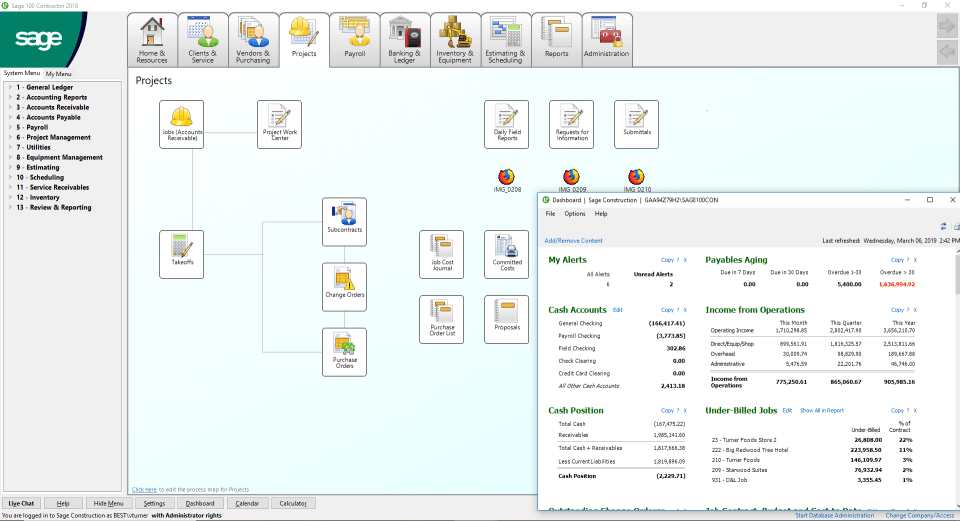
Sage 100 Contractor is designed for project management and caters specifically to small and mid-sized contracting businesses.
We have found from using this product that it’s an easy-to-use, integrated solution that lets contractors take complete control of their businesses.
Sage 100 Contractor offers several features, such as:
- A project work center with project portfolio management, where managers can track every detail of their project.
- Equipment and tool calibration management, which ensures that all equipment is functioning optimally and safely. This is critical for project success and site-specific safety training records.
- Integration with ToolOps, a flexible construction resource management software that helps with equipment and asset tracking, so you can keep track of tools and ensure effective resource and equipment allocation.
Note that its integration with ToolOps encompasses:
- Equipment maintenance and repairs tracking.
- Construction equipment telematics.
- Resource and equipment downtime tracking.
- Equipment usage analytics.
Plans and pricing
Pricing for Sage 100 Contractor is available upon request.
6. FieldWire
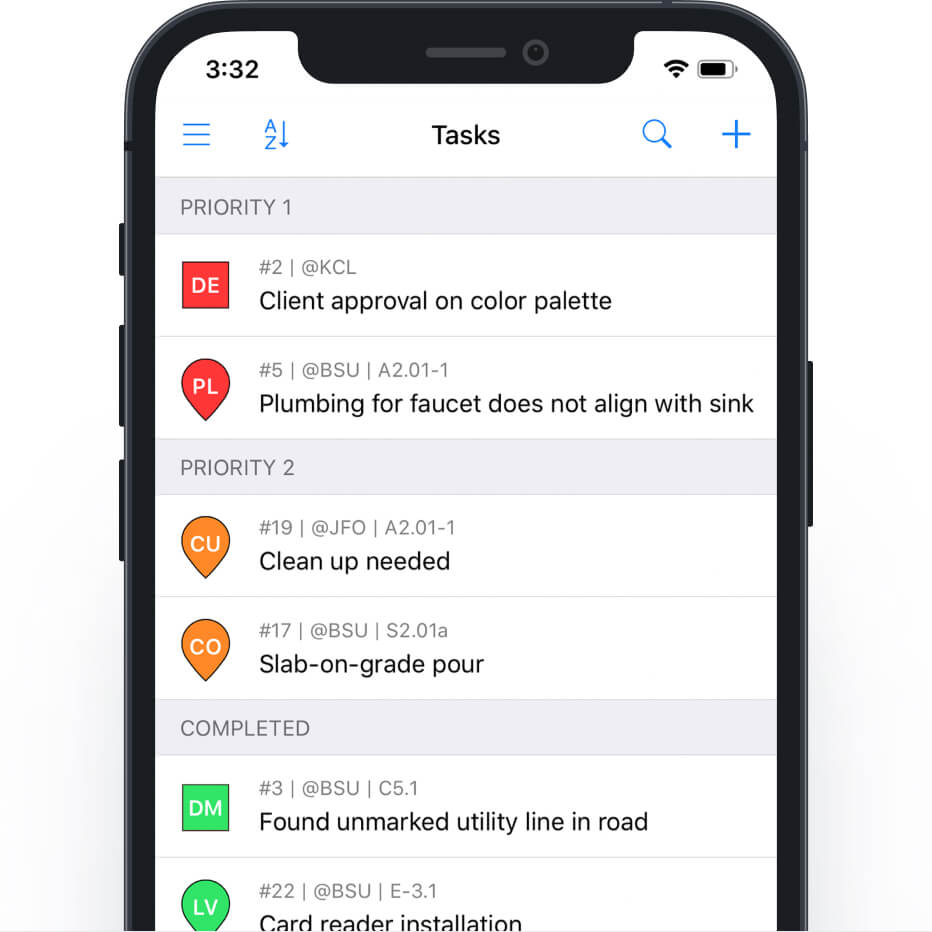
Next on our list of the best construction management software is FieldWire.
FieldWire is an all-in-one jobsite management and risk management solution that increases transparency and optimizes construction processes for efficiency.
It does this by providing project managers with key features to simplify field service and workforce management, including:
- A cloud-based jobsite coordination platform that offers cloud-based storage for project documentation.
- Giving construction teams real-time access to all related documents and photos. This ensures optimal collaboration with subcontractors and suppliers.
- Standardized inspection and compliance checklists and templates, as well as punch list apps to speed up the closeout process.
Plans and pricing
FieldWire offers a free trial for small teams of up to five users. From there, there are three pricing options:
- Pro: $29 per month.
- Business: $49 per month.
- Premier: $89 per month.
7. Buildertrend
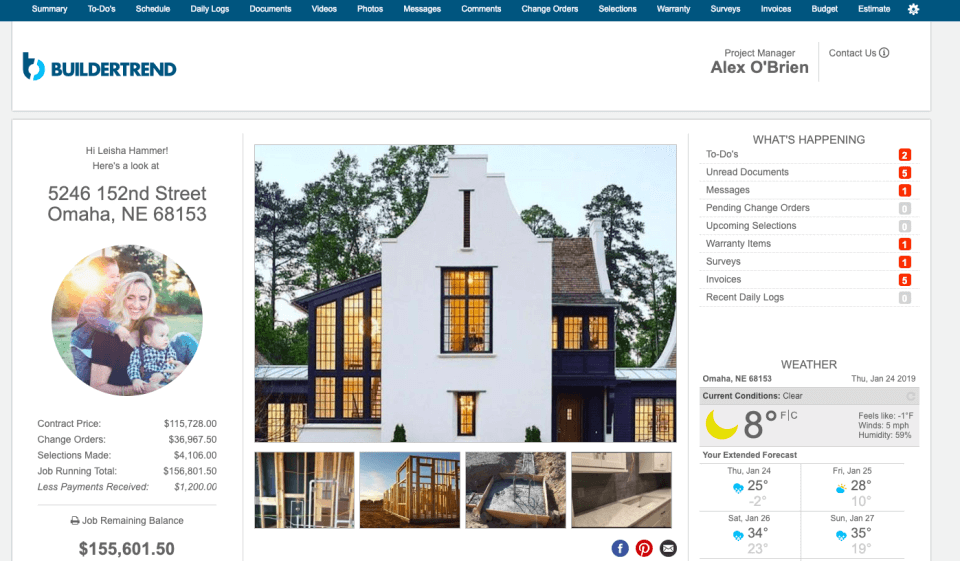
Buildertrend is one of the best construction management software solutions, as it provides you with the necessary tools to handle every part of a project, such as:
- Your pre-sales process.
- Project management and scheduling.
- Customer management.
Our analysis of this product revealed that its strongest features are:
- Powerful client and customer relationship management (CRM), with a client portal for project tracking.
- A scheduling tool that serves as the backbone of the platform. It lets managers make schedule changes for subcontractors or teammates on the go and alert them in real time.
- A client and customer feedback management system through a portal, enabling seamless communication and feedback collection from clients.
Plans and pricing
The Buildertrend Core plan costs $99 per month, while the Pro plan costs $299 per month.
8. Float
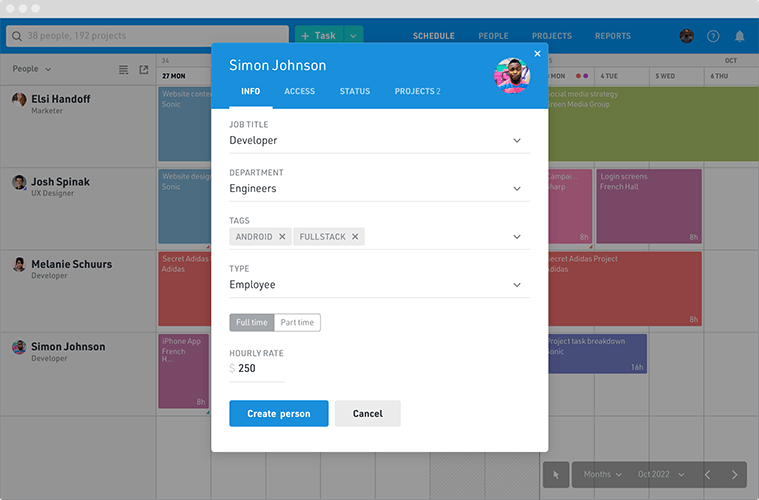
Float is a resource allocation and tracking platform made for various business sizes and industries, from consultancies to architecture firms.
Float is one of the best construction management software solutions because it integrates with other systems for seamless data exchange. From QuickBooks to Slack integrations, Float saves you the hassle of switching between platforms.
In terms of its project management capabilities, Float:
- Assigns tasks and responsibilities to team members in a matter of seconds, who can then make changes in just a few clicks.
- Enables detailed project timeline and milestone tracking and delegates tasks to certain teams or members.
- Updates project statuses and milestones.
Plans and pricing
Float’s resource planning software costs $6 per user per month. If you add the time tracking feature, you pay a total of $10 per user per month. This feature allows for accurate time and attendance management.
9. STACK
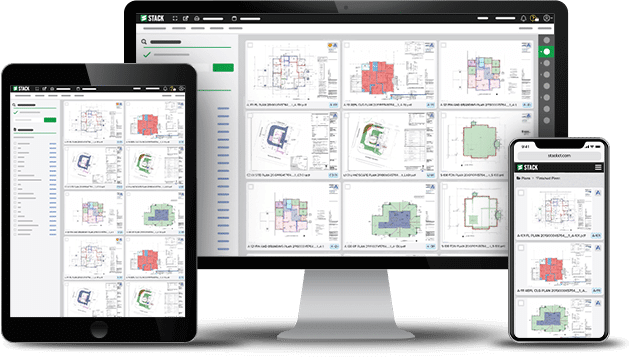
STACK is a cloud-based construction software that automates repetitive tasks and workflows. It enables construction managers to complete takeoffs and estimate faster and more accurately than the old-school, pen-and-paper system.
After trying out this product, we found out that it lets construction managers:
- Save hours using powerful automation tools like AutoCount, takeoff templates, and pre-built materials.
- Create detailed, professional cost estimates complete with branding.
- Leverage functionality that simplifies the bid and proposal process.
Plans and pricing
This construction project management software has two pricing tiers: $1,999 per year for single estimators and $4,999 per year for pre-construction teams. A free trial is available for a limited number of projects.
10. 123worx
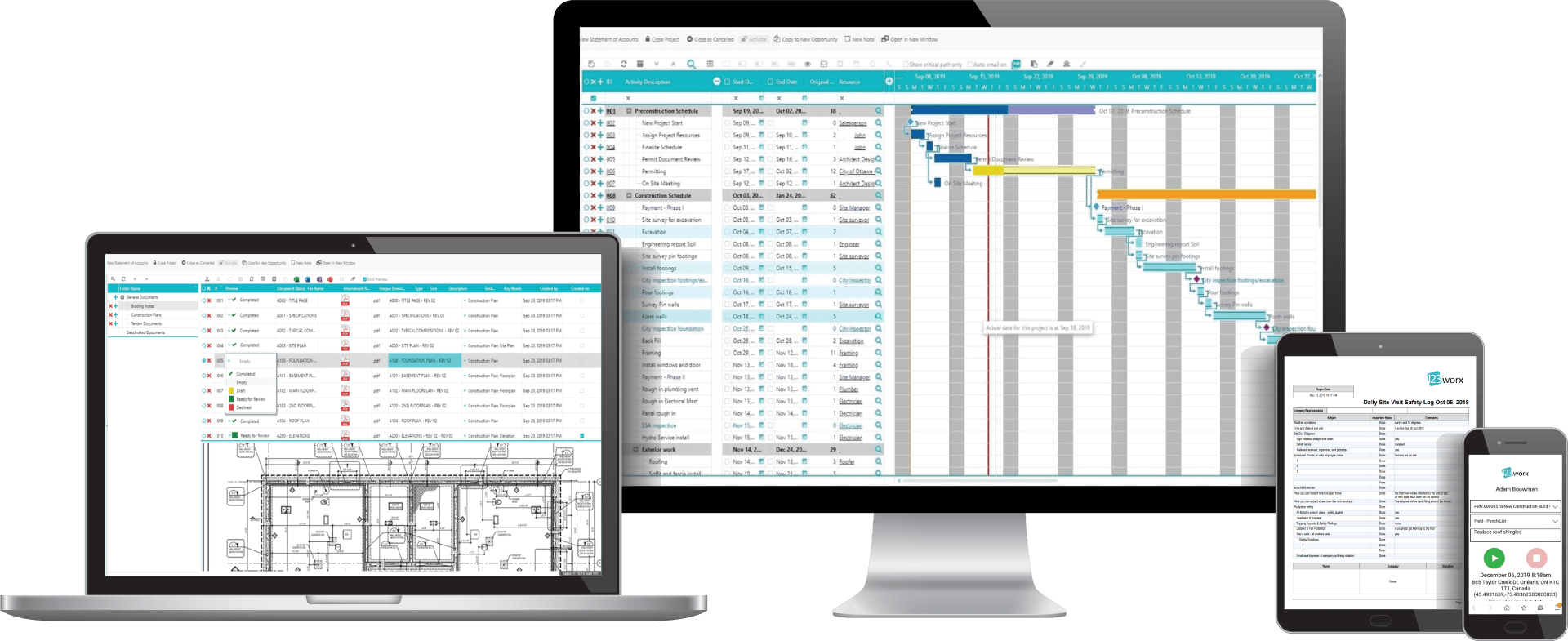
Next on our list of the best construction management software companies is 123worx.
123worx is a cloud-based solution that provides construction managers with project management tools to manage complex construction projects efficiently.
Here are some of 123worx’s key features:
- Job estimation templates and tools for efficient project management.
- Powerful resource allocation and schedule optimization for efficient operations.
- Document collaboration tools and project collaboration and communication logs.
- Integrations with platforms like Office 365, which enhances communication among project stakeholders.
- For selected or all active projects, you get warranty claim resolution and cost tracking for client satisfaction.
Plans and pricing
Pricing is available upon request.
11. PlanGrid
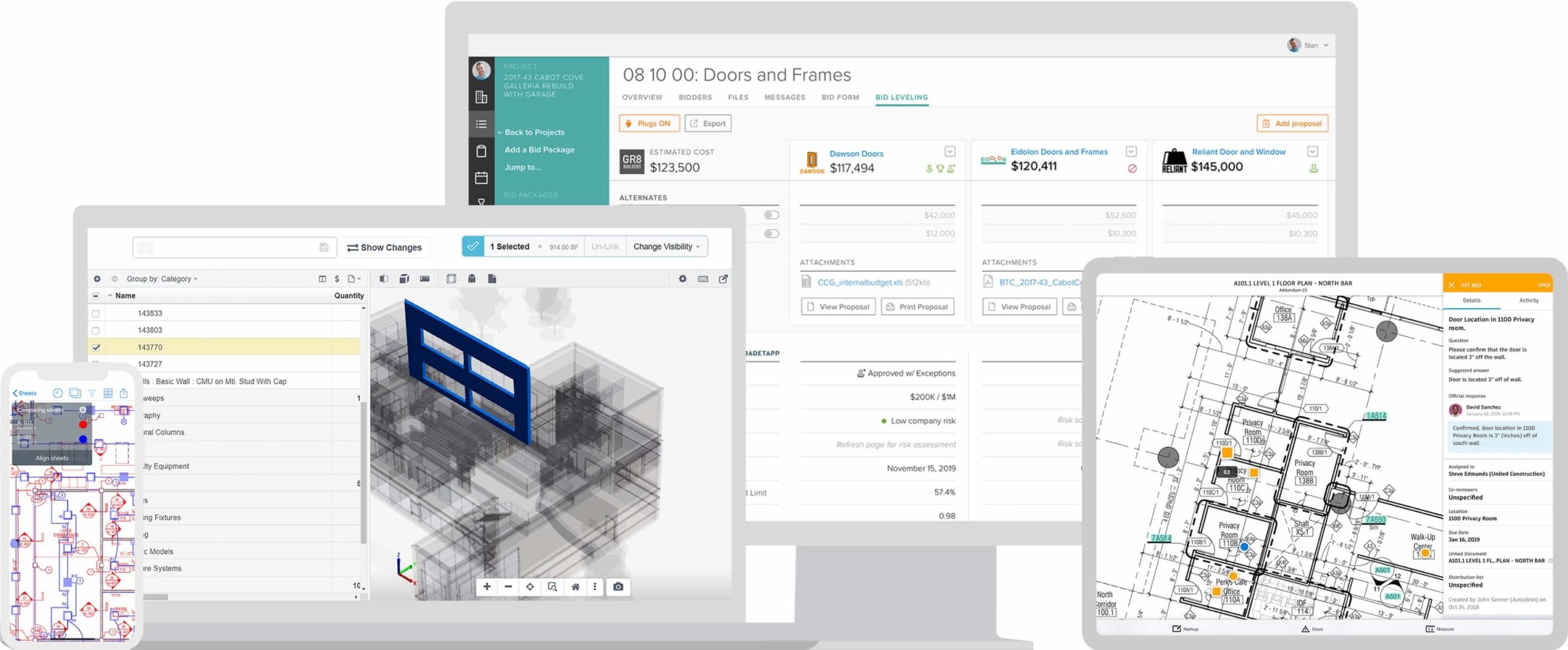
Autodesk Build, formerly known as PlanGrid, is a software made for builders that facilitates efficient construction project management.
As one of the best construction management software solutions on the market, Autodesk Build provides a range of tools for:
- Project management.
- Quality management.
- Safety management.
- Cost tracking and variance analysis.
We determined through our tests that these are this solution’s best features:
- A central dashboard for managing design templates that improves safety and quality control in construction projects.
- Cost forecasting tools that deliver the most accurate and up-to-date results.
- Real-time weather and site conditions monitoring so that project teams are always well-prepared and on track.
Plans and pricing
A custom quote and demo are available upon request.
12. PENTA
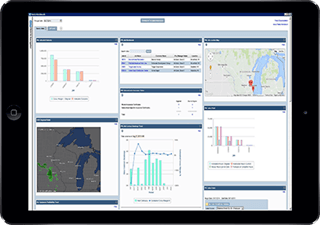
PENTA construction management software is an all-in-one tool for four key areas of every construction job:
- Project management.
- Construction accounting.
- Service management.
- Equipment management.
PENTA works for several specialties in the construction industry, from industrial contractors to electrical contractors.
Its key features include:
- Comprehensive analyses of the costs of former projects and accurate forecasts for future builds. This enhances resource allocation and scheduling optimization as well.
- A customer portal, where customers can access their service history, client billing and invoicing details, and other key information.
Plans and pricing
Contact PENTA for a custom quote.
Construction companies increasingly rely on sophisticated software that provides tools for scheduling and task allocation, which is crucial for project efficiency. These solutions offer a range of functionalities, including:
- Real-time project tracking.
- Resource management.
- Budgeting.
- Communication tools.
Integrating these features, the software enables seamless task coordination. This ensures timely project completion and effective resource utilization, which are vital for construction industry businesses.
What to look for in the best construction management software?
Selecting the ideal construction management software involves more than just assessing basic functionalities. This section provides some tips on some key aspects to consider.
For one, you must ensure powerful data security and privacy measures, as the protection of sensitive project data is paramount. User permissions and access control are also essential, as they provide flexibility and security in data management.
You also need to look for industry-specific features and compliance. The software should adhere to building code compliance standards and permitting. It should also abide by regulatory reporting and compliance standards, which is critical to ensure projects meet legal requirements. No matter the size of your business, you need to ensure a regulatory audit trail and compliance reporting for legal compliance.
Also, your software needs to include features relevant to your unique construction projects. For example, capabilities like change order management and cost analysis are important. By managing change orders efficiently, you can adapt to project alterations.
It’s also important to consider whether you need cloud-based or on-premises deployment. Remember that with a cloud-based solution, your team can access your data from anywhere.
Onsite safety is another critical consideration. Look for a solution that enhances safety through monitoring and proactive management to reduce the likelihood of accidents and ensure compliance with health and safety regulations.
Bid and proposal management is also a significant part of construction management. So, you’ll need software that simplifies this process, making it easier to draft, revise, and submit proposals. This leads to better project opportunities and more efficient operations.
Plus, consider aspects like warranty and service management or warranty claim resolution and cost tracking, which are important for post-construction phases.
Finally, it’s equally important not to overlook software that includes environmental and sustainability tracking features. After all, there’s a growing emphasis on eco-friendly practices and environmental impact assessment monitoring and reporting in construction.
How much does construction project management software cost?
Construction project management software comes in all shapes and sizes, and so do their costs. There is no one-size-fits-all solution, and each provider sets its own price.
To give you an idea, our research indicates that the average cost per user per month is $16.88. That being said, the cost varies greatly depending on factors such as:
- The size of your business.
- The complexity of your projects.
- The specific features you need.
When choosing software, functionality should be the driving force behind your decision. As the number of features grows, so will your costs.
Keep in mind that the true cost of software includes not just the price of the software itself. You also need to calculate things like:
- The cost of implementation to adopt it.
- User training and support.
- On-site personnel training management.
- Field service technician training and certification management for competence.
- Equipment maintenance scheduling and cost analysis for efficiency.
- Any required hardware.
It’s also important to mention that many providers offer custom quotes, so you’ll need to reach out directly to get an accurate price based on your needs.
Key takeaways
Through our practical knowledge, construction managers must keep track of every aspect of a project, including:
- Material procurement tracking and optimization.
- Inspection and testing compliance records.
- Risk assessment and mitigation plans tracking.
Considering how the industry has only gotten faster, construction companies need the best construction management software to support operations and stay on top of everything.
The right construction management software gives you the power to monitor and manage each project’s moving parts from one centralized platform, which improves workflow efficiency and reduces manual data entry.
FAQs
What are the 4 types of management in construction?
The four types of management in construction are:
Project management: This involves the planning, coordination, and execution of a construction project from start to finish.
Cost management: This refers to using a tool that assists in budget tracking and financial forecasting, job costing and profitability analysis, and cost control. Construction companies need to conduct detailed cost breakdowns, such as equipment calibration and maintenance cost analysis.
Time management: This covers aspects like project scheduling, tracking, and adjustments to ensure projects are completed on time.
Quality management: This ensures compliance with things like site-specific safety regulations compliance and permitting and regulatory compliance standards. It also includes standards that the project follows in terms of design specifications and environmental impact tracking.
What is the best software for building materials?
Construction businesses put various procedures in place to ensure they source quality equipment materials. This includes things like:
- Vendor and supplier scorecards and evaluation.
- Vendor and supplier qualification and performance evaluation for quality assurance.
- Equipment maintenance cost analysis.
That said, managing building materials efficiently is crucial. Advanced software solutions are available, which offer powerful features for inventory and materials management.
This type of software is an asset as it enhances operational efficiency and reduces waste in building projects.
What is BIM in construction?
Building Information Modeling (BIM) involves creating digital representations of the physical and functional characteristics of a building.
BIM supports 3D modeling and design visualization and integration with architectural and design software so that engineering and construction (AEC) professionals have the tools for building and infrastructure maintenance.
How can construction management software improve my construction project’s efficiency?
Construction management software improves your project’s efficiency in the following ways:
- Automation: It automates manual tasks, reducing errors and saving time.
- Collaboration: It provides a single platform for communication and document sharing and collaboration with clients and stakeholders for transparency and communication or document sharing with clients and regulatory authorities.
- Real-time financial tracking and forecasting: It lets you track your project’s progress in real time, helping you make quick adjustments.
- Data analysis: It offers powerful data analysis tools, so you can make informed decisions to improve performance and reduce costs.
Ready to transform your construction business?
Start your free trial with Method.
Image credits: Mikael Blomkvist via Pexels